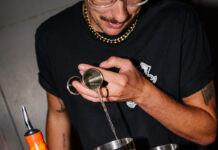Looking forward by looking to the back

FRONT of house may be the part of a venue that has most contact with customers, but even the friendliest, most welcoming venue is likely to run into problems if its back of house areas aren’t well maintained.
And cellar management specialists have argued that the beer cellar, in particular, needs to be well cared for if customers are to have the best experience possible.
Richard Cooper, managing director of Clear Brew Glasgow North, said the cellar is sometimes first choice for licensees looking to cut their costs as it’s an area of the venue that can be “out of sight, out of mind”.
“This attitude can quickly lead to a very poor quality pint,” said Cooper.
“There is no point in cutting costs if it also impacts profits, and in this day and age nothing is going to lose you customers quicker than poor quality.
“Therefore, good cellar management practices and staff training should always be a priority.”
Carolyn Daniel, director of StayClean Beer Pipe System, agreed.
She said: “Beer lines suffering biofilm build-up will quickly taint the taste of the beer pulled through them, ruining the flavour and serve of the beer and (if the problems are ongoing), also ruining the reputation of the bar.
“Drinkers are mobile and will vote with their feet.”
The dangers were highlighted by figures from Cask Marque, the training and accreditation company, which claimed 29% of consumers will go to a different outlet if the quality of beer is poor, rising to 35% for cask beer drinkers, who are famously fussy about the quality of their beer.
The company also reported that 44% of consumers would not order the same drink again if they perceived it as poor quality, with this rising to 60% for cask ale drinkers.
Customers were also said to be less likely to spend money on food if an outlet’s beer quality is poor, with negative reviews more likely than ever to circulate via social media as well as word of mouth.
The flipside of this, according to Cask Marque, is that 68% of customers will willingly pay more for beer if it is good quality.
Regularly scheduled cleaning – both of the beer lines and cellar itself – is essential, said firms.
Cooper of Clear Brew advised operators to draw up a cleaning schedule and ensure staff keep to it, avoiding the attitude of “when we get the chance”.
And Daniel of StayClean stressed the importance of ensuring lines are cleaned properly, saying staff “need to ensure that they are getting the cleaning fluids through every element of the system”.
“It’s not uncommon to find lines building-up biofilms and pollutants and discover that whilst the lines have been thoroughly cleaned, the cellar buoys and other elements of the set-up have only had a cursory flush, allowing the pollutants to stay in the system and quickly start to re-spread,” she said.
Mopping floors, washing walls and sterilising equipment were all said to be important in keeping a cellar clean, with steps such as arranging kegs by date and removing empty kegs when they are changed helping to keep the space organised and efficient.
Other maintenance includes checking gas levels, coolers and keg dates.
Maintaining a steady cellar temperature was also said to be essential, as warmer temperatures can cause residual yeast in the lines to ferment, causing fobbing.
“Aim for a cellar temp between eight and 11 degrees Celsius for optimised conditioning and avoid keeping things like fridges and freezers in your cellar, as they generate heat that requires cooling to overcome,” said Daniel of StayClean Beer Pipe System.
“Keep it cool, but try to keep on top of your costs.”
This was supported by cellar specialist Innserve.
A spokesman for the company said cellar cooling is “the number one item on the list where some pubs fall short”.
But it doesn’t have to be that way. The spokesman said that as cellar technology has advanced new equipment has made temperature control much easier.
“Modern programmable cooling solutions intuitively ‘learn’ the power usage patterns of individual coolers, constantly monitoring and optimising energy use by adapting to all cellar conditions,” said the spokesman.
“By programming systems for opening times, dispense is safeguarded during trading hours and cooler costs can be kept to a minimum when a venue is closed to guests.”
Ultimately, it’s not enough for the licensee to be aware of the importance of cellar management, said firms; operators have to ensure the message is heard by staff.
“They must understand its impact on what is a critical part of your livelihood,” said the Innserve spokesman.



















